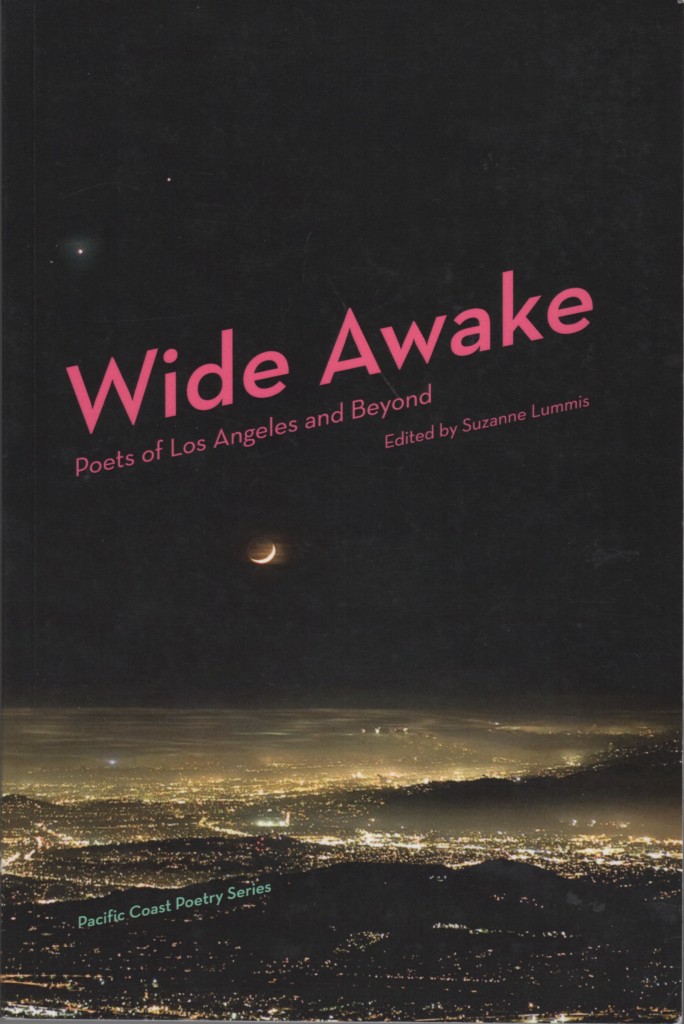Saturday, April 25, 2015

A reading to celebrate the publication of Wide Awake: The Poets of Los Angeles and Beyond will be held at Beyond Baroque on Saturday, May 9th, at 4:00. According to an e-mail I received this afternoon from Suzanne Lummis, about half of the poets in the book will be there to read one poem each. My MFA students are giving a reading in Long Beach that same afternoon, and I have decided to give the best overall class of students I have ever worked with their well-deserved final round of pedagogical applause. From that day forward, those students will be my peers, and not my subordinates; they have earned the recognition that only my presence that day can bestow. I am certain that the gathering at Beyond Baroque on May 9th will be a boisterous occasion, and I would love to celebrate the latest iteration of L.A.’s most visible poets. I regret especially that I will not be there to hear Liz Gonzalez read her poems. I am fortunate at my age to have a job, however, and doubly fortunate to have such good students. I have cast my lot in Long Beach.
Suzanne Lummis has done a solid job in assembling a representative selection of L.A. poets for her most recent anthology, and the book deserves to have a substantial audience. On the whole, though, the book seems to homogenize the various scenes in Los Angeles, so that one has little sense of how disparate the poetics of many poets in this city have been during the past three decades, let alone the past half-century. There have been at least a dozen anthologies of Los Angeles poets since 1960, beginning with “Poetry Los Angeles” (which is not to be confused with Laurence Goldstein’s marvelous study of poems about Los Angeles, published by the University of Michigan Press in 2014). Not one of these anthologies has followed the lead of Donald Allen’s or Ron Silliman’s anthologies and included some critical commentary by the poets that articulates their specific poetics. The need at this point is for a book that has fewer poets and more reflection in prose on the poems.
In truth, I have yet to have a chance to give Wide Awake a close reading, but even at first glance the book is rather startling in how it constitutes a census of the decimation of the L.A. poetry scenes since 1985 (only a handful of the poets in Wide Awake were active in Los Angeles a decade earlier). As good an anthology as Wide Awake is likely to turn out to be, it is a touch disheartening to realize how many poets have either left the scene, died, or remain unaccounted for as still being present and active as poets in Los Angeles. In writing the first review of Wide Awake, David Ulin has made the proper choice in focusing on the poets who are included in Lummis’s anthology rather than dwelling on the absent figures. Even so, it is perhaps indicative of this aporia that the second sentence of David Ulin’s commentary on Wide Awake cites four poets who made an initial impact on his literary knowledge of Los Angeles, and the only one of these four who is in Wide Awake is dead. (“I got to know Los Angeles through its poetry. Even before I lived here, I experienced a different, human, side of the city through the works of Wanda Coleman, Michelle T. Clinton, Amy Gerstler, David Trinidad.”) Olin’s article can be found at the following link:
At the risk of being seen as a dour, nostalgic grouch, I have decided that too many poets are absent from Wide Awake not to let the absentees (or their surviving friends and family) know that they deserve to be in some future anthology of Los Angeles poetry, one that will give a comprehensive picture of the 200 best poets to work here since the end of World War II. To lead off, I mention Alvaro Cardona-Hine and Jack Hirschman, both of whom were in both anthologies of L.A. poets worked on by Paul Vangelisti in the early 1970s. Along with Clayton Eshleman, John Harris, Victor Valle, and Joseph Hansen, Cardona-Hine and Hirschman represent strains of poetry that have made Los Angeles a particularly complicated arena for the contemporary practice of an ancient art given renewed reverence by its most renitent adherents. Let the roll-call commence, and let it be emphasized that this is not some definitive list. I have not listed, for instance, any young poets who have studied with me at CSU Long Beach and who have begun publishing their work.
Living L.A. poets absent from Wide Awake:
Frank T. Rios; Martha Ronk; Marisela Norte;
Yvonne de la Vega; Roger Taus; Daniel Tiffany;
Fred Voss; Joan Jobe Smith; Brian Kim Stefans;
Will Alexander; Anthony Seidman; Aleida Rodriguez;
Martha Ronk; Juan Delgado; Ramon Garcia;
Douglas Messerli; Jack Grapes; Mindy Nettifee;
Julia Stein; Nancy Shiffrin; Anthony McCann;
Harold Abramowitz; Matthew Timmons;
David Shook; Barbara Maloutas;
Todd Baron; Blair H. Allen;
John Doe; Exene Cervenka;
Dave Alvin; Amy Gerstler;
Tim Reynolds.
L.A. poets who left town between 1980 and 2010 and are not in Wide Awake:
Brooks Roddan; Richard Garcia;
Doren Robbins; Standard Schaeffer;
Dennis Cooper; David Trinidad;
Michelle T. Clinton; Kate Braverman;
Michael Lally; Ian Krieger.
Poets in “Poetry Loves Poetry” (1985) or Grand Passion (1995)
who switched to other genres / other occupations
Jim Krusoe; David James; Max Benavidez; Peter Cashorali
L.A. POETS WHO DIED BETWEEN 1970 and 2015
John Thomas; Philomene Long;
Ann Stanford; Joan LaBombard;
FranceYe (Frances Dean Smith); Charles Bukowski;
Leland Hickman; Bob Flanagan;
Stuart Perkoff; William Pillin;
Bruce Boyd; Grover Jacoby, Jr.;
Lawrence Spingarn; Charles Gullans;
Robert Peters; Peter Schneidre;
Dick Barnes; Robert Crosson;
Scott Wannberg; Charles Bivins;
Mel Weisburd; Manazar Gamboa;
Bert Myers; Marine Robert Warden;
Susannah Foster; Ed Smith;
Curtis Zahn; John Brander;
Carol Lem; Maria Fattorini;
Robert Greenfield; Tony Scibella.
 About Bill Mohr
About Bill Mohr